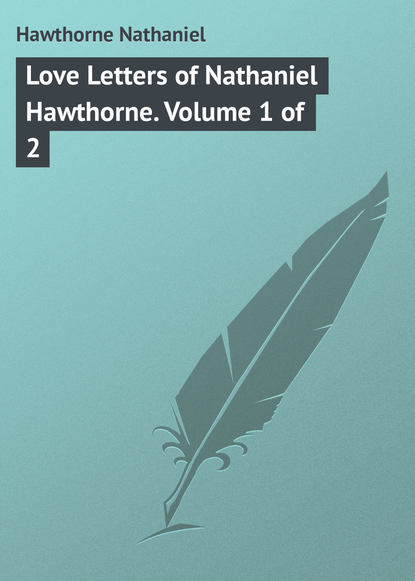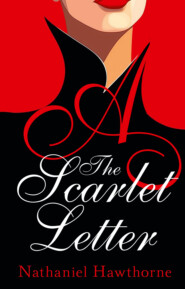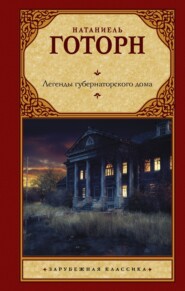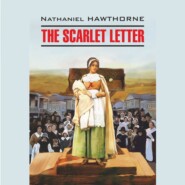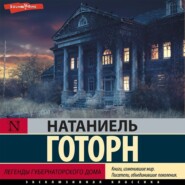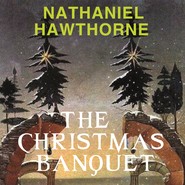По всем вопросам обращайтесь на: info@litportal.ru
(©) 2003-2025.
✖
Love Letters of Nathaniel Hawthorne. Volume 1 of 2
Автор
Год написания книги
2017
Настройки чтения
Размер шрифта
Высота строк
Поля
June 12th. ½ past 7 A.M. – Belovedest, art thou not going to be very happy to-day? I hope so, and believe so; and, dearest, if thou findest thyself comfortable at Concord – and if the Emersonians love thee and admire thee as they ought – do not thou too stubbornly refuse to stay a week longer than the term first assigned.
(Remainder of letter missing)
TO MISS PEABODY
Boston, June 22d, (Monday) ½ past 4 [1840]
Ownest, Colonel Hall put thy letter into my hand at our eating-house, so that its reception was timed very like that of mine to thee; but thy husband cared not for ceremony, nor for the presence of fifty people, but straightway broke the "long-legged little fowl" asunder and began to read. Belovedest, what a letter! Never was so much beauty poured out of any heart before; and to read it over and over is like bathing my brow in a fresh fountain, and drinking draughts that renew the life within me. Nature is kind and motherly to thee, and taketh thee into her inmost heart and cherisheth thee there, because thou lookest on her with holy and loving eyes. My dearest, how canst thou say that I have ever written anything beautiful, being thyself so potent to reproduce whatever is loveliest? If I did not know that thou lovest me, I should even be ashamed before thee. Sweetest wife, it gladdens me likewise that thou meetest with such sympathy there, and that thy friends have faith that thy husband is worthy of thee, because they see that thy wise heart could not have gone astray. Worthy of thee I am not; but thou wilt make me so; for there will be time, or eternity enough, for thy blessed influence to work upon me. Would that we could build our cottage this very now, this very summer, amid the scenes which thou describest. My heart thirsts and languishes to be there, away from the hot sun and the coal-dust and the steaming docks, and the thick-pated, stubborn, contentious men, with whom I brawl from morning till night, and all the weary toil which quite engrosses me, and yet occupies only a part of my being which I did not know existed before I became a Measurer. I do think that I should sink down quite disheartened and inanimate if thou wert not happy, and gathering from earth and sky enjoyment for both of us; but this makes me feel that my real, innermost soul is apart from all these unlovely circumstances, – and that it has not ceased to exist, as I might sometimes suspect, but is nourished and kept alive through thee. Belovedest, if thou findest it good to be there, why wilt thou not stay even a little longer than this week? Thou knowest not what comfort I have in thinking of thee and those beautiful scenes; where the east wind cometh not, and amid those sympathizing hearts, which perhaps thou wilt not find elsewhere – at least not everywhere. I feel as if thou hadst found a haven of peace and rest, where I can trust thee without disquiet, and feel that thou art safe. It thou art well and happy, if thy cheek is becoming rosier, if thy step is light and joyous there, and if thy heart makes pleasant music, then is it not better for thee to stay a little longer? And if better for thee, it is so for thy husband likewise. Now, ownest wife, I do not press thee to stay, but leave it all to thy wisdom, and if thou feelest that it is now time to come home, most gladly will he welcome thee.
Dearest, I meant to have written to thee yesterday afternoon, so that thou shouldst have received the letter today, but Mrs. Hillard pressed her husband and myself to take a walk into the country, because his health needed such an excursion. So, after taking a nap, we set forth over the western avenue – a dreary, treeless, fierce-sunshiny, irksome road; but after journeying three or four or five miles, we came to some of the loveliest rural scenery – yes, the very loveliest – that ever I saw in my life. The first part of our road was like the life of toil and weariness that I am now leading; the latter part was like the life that we will lead hereafter. Would that I had thy pen, and I would give thee pictures of beauty to match thine own; but I should only mar my remembrance of them by the attempt. Not a beautiful scene did I behold but I imaged thee in the midst of it – thou wast with me in all the walk, and when I sighed it was for thee, and when I smiled it was for thee, and when I trusted in future happiness, it was for thee; and if I did not doubt and fear, it was altogether because of thee. What else than happiness can God intend for thee? – and if thy happiness, then mine also. On our return, we stopped at Braman's baths, and plunged in, and washed away all stains of earth, and became new creatures. Dearest, I sympathize with thee in thy love of the bath, and conveniences for it must not be forgotten in our domestic arrangements. Yet I am not entirely satisfied with any more contracted bath than the illimitable ocean; and to plunge into it is the next thing to soaring into the sky.
This morning I rose early to finish measuring a load of coal, which being accomplished in the forenoon, and there being little prospect of anything more to do, Colonel Hall, who perceived that thy husband's energies were somewhat exhausted by the heat, and by much brawling with the coal-people, did send me home immediately after dinner. So then I took a nap, with a volume of Spenser in my hand, and awaking at four, I re-re-reperused thy last letter, and sat down to pour myself out to thee, and in so doing, dearest wife, I have had great comfort. And now the afternoon is beautiful in its decline; but my feet are somewhat afflicted with yesterday's excursion; so that I am in doubt whether to go out again, although I should like a bath.
Belovedest, I must not forget to thank Mr. Emerson for his invitation to Concord; but really it will not be in my power to accept it. Do thou say this in the way it ought to be said, and let him know what a business-machine thy husband is. Now, good-bye. Art thou very happy? I trust so, dearest. Thou hast our whole treasure of happiness in thy keeping. Keep it safe, ownest wife, and add to it continually. God bless thee.
Miss Sophia A. Peabody,
Care of Rev. R. W. Emerson,
Concord, Massachusetts.
(Forwarded, Salem).
TO MISS PEABODY
Boston, July 10th, 1840 – Morning
Belovedest,
Doubtless thou didst expect a letter from me yesterday; but my days have been so busy, and my evenings so invaded with visitants, that I have not had a moment's time to talk with thee. Scarcely, till this morning, have I been able to read thy letter quietly. Night before last, came Mr. Jones Very; and thou knowest that he is somewhat unconscionable as to the length of his calls. Yesterday I came home early; and had the fates been propitious, thou shouldst have had a long letter; but in the afternoon came Mr. Hillard's London brother, and wasted my precious hours with a dull talk of nothing; and in the evening I was sorely tried with Mr. Conolly, and a Cambridge law-student, who came to do homage to thy husband's literary renown. So my sweetest wife was put aside for these idle people. I do wish the blockheads, and all other blockheads in this world, could comprehend how inestimable are the quiet hours of a busy man – especially when that man has no native impulse to keep him busy, but is continually forced to battle with his own nature, which yearns for seclusion (the solitude of a united two, my belovedest) and freedom to think, and dream, and feel.
Well, dearest, thy husband is in perfect health this morning, and good spirits; and much doth he rejoice that thou art so soon to be near him. No tongue can tell – no pen can write what I feel. Belovedest, do not thou make thyself sick in the bustle of removing; for I think that there is nothing more trying, even to a robust frame and rugged spirit, than the disturbance of such an occasion. Now, good-bye; for I must hurry to the Custom-House to see Colonel Hall, who is going out of town for two days, and will probably leave the administration of our department in my hands.
God bless thee, belovedest; – and perhaps thou wilt receive another letter before thy advent, but do not thou count upon it.
Thine ownest Husband,
De l'Aubepine.
Miss Sophia A. Peabody,
Care of Dr. N. Peabody,
Salem, Mass.
TO MISS PEABODY
54 Pinckney St., August 9th [1840]
Ownest Dove,
I have almost forgotten how to write letters – not having put pen to paper for that purpose (or any other, indeed) since my last to thee; but I cannot help writing thee a few lines, now when I had hoped to be listening to thy sweetest voice. Art thou much changed in this intervening time? Is thy hair grown gray? Art thou an old woman? Truly, it does appear very, very long to thy husband – an incomputable period. Belovedest, I had been out this forenoon; and when I returned, there was thy letter, lying on the threshold of my chamber-door. I had a presage of calamity, as soon as I saw it. Had I known of this visit of thine aunt, I would have taken the opportunity to go to Salem, and so we would have had next Sunday to ourselves. Does thine aunt say that thou lookest in magnificent health? – and that thou art very beautiful? If she has not yet said so thou shouldst ask her opinion on that point.
Belovedest, even if thine aunt Curtis should stay a week, do not thou incommode thy mother and sisters by trying to arrange a meeting. It is very painful to me to disturb and derange anybody in the world.
Thou dost not say whether thou art very well to-day – and whether thou art light of heart. I beseech thee never to write me even the shortest note, without giving me a glimpse of thyself in the very moment of writing; – and yet, I leave it all to thee, and withdraw this last petition. Thou knowest best what to write; for thou art an inspired little penwoman.
Thy husband is to measure salt at the end of Long Wharf tomorrow, and the next day, and probably the next, and the next. It is as desirable a place and employment as a Measurer can expect; so let thy visions of me be rather pleasurable than otherwise. I am in particularly good health; but my heart hungers for thee – nevertheless, I mean to be cheerful and content. Do thou be so likewise, little Dove – and naughty Sophie Hawthorne too. Now, good-bye. This is a very empty letter – at least, it would be so, if it had not an infinite love in it. God bless thee.
Miss Sophia A. Peabody,
No. 13 West street,
Boston.
TO MISS PEABODY
54 Pinckney St. August 24th, ¼ past 6 P.M. [1840]
Own belovedest,
I had a presentiment of a letter from thee this morning; and so was not at all surprised when I saw thy father in the long, low, darksome room where thy husband was in durance. But I had not the least anticipation of the intelligence which thou didst send me; and it is the harder to be borne, because – (do not be naughty, ownest Dove) – I have an indispensable engagement at Cambridge tomorrow afternoon and evening; whereby our meeting must be delayed yet another day. Dearest, do set me a lofty example of patience. Be very good and very quiet, and enjoy thy Aunt Curtis's society to the utmost, and press her to stay with thee till Wednesday at six o'clock. But not an hour longer! Thou must absolutely eject [her] with thine own tender little hands, if she propose to tarry that night also.
Belovedest, I went to the Hurley Burley last evening; and considering that it was the first time I had been there without thee since we were married, I enjoyed it very well. We had a good deal of talk; but I missed thy gentle voice, which is surely the sweetest sound that was ever heard anywhere save in Paradise. Thy husband talked somewhat more than is his wont, but said nothing that is at all worth repeating; and I think he might as well have dispensed with saying anything. He shows his wisdom and policy much more in his general silence than in his occasional loquacity. Dearest, if I had not so high a respect for thy judgment, I should pronounce thy husband but a tolerable person, at best; but as thou hast been impelled to give thy precious self to such a man, there must be more in him than ordinary eyes can perceive. Miss Burley proposed to me to write an address of some kind for the Bunker-Hill fair; but I manifested no readiness to comply – neither do I feel any. Has my Dove contributed anything?
I went home in the midst of that beautiful rain, and sat up two hours with Elizabeth and Louisa.
This has not been a toilsome day, my wife. Indeed, I have had nothing to do; nor is it certain that I shall be employed tomorrow morning. Quite unexpected is this lull amid the tempest of business. I left the Custom-House at about four o'clock, and went to the bath, where I spent half an hour very deliciously. Dearest, we must have all sorts of bathing conveniences in our establishment. Thou art a water-spirit, like Undine. And thy spirit is to mine a pure fountain, in which I bathe my brow and heart; and immediately all the fever of the world departs. Thou art – but I cannot quite get hold of the idea that I meant to express; and as I want to leave a part of the page till tomorrow morning, I will stop here. God bless thee. I think I shall dream of thee to night, for I never loved thee so much.
Miss Sophia A. Peabody,
No. 13 West street,
Boston.
TO MISS PEABODY
54 Pinckney St. Sept. 18th, 1840. 8 o'clock P.M.
Sweetest Dove,
Thy father, apparently, did not see fit to carry thy letter to the Custom-House; and yet I think my intuition informed me that a letter was written; for I looked into the Desk very eagerly, although Colonel Hall neither pointed with his finger nor glanced with his eye, as is his custom when anything very precious is in store. It reached me here in mine own tabernacle, about half an hour since, while I sat resting myself from the toils of the day, thinking of thee, my Dove.
Thou didst make me happier, last evening, than I ever hoped to be, save in Heaven – and still that same happiness is around me and within me. I am the happier for everything thou dost and sayest – thou canst not possibly act so that I will not love thee better and be the happier for that very individual action.
Dearest, it was necessary that I should speak to thee to-night; but thou must not look for such a golden letter as thou didst write this morning; for thy husband is tolerably weary, and has very few thoughts in his mind, though much love in his heart. I cannot do without thy voice – thou knowest not what a sweet influence it has upon me, even apart from the honied wisdom which thou utterest. It thou shouldst talk in an unknown tongue, I should listen with infinite satisfaction, and be much edified in spirit at least, if not in intellect. When thou speakest to me, there is mingled with those earthly words, which are mortal inventions, a far diviner language, which thy soul utters and my soul understands.
Ownest Dove, I did not choose to go to Malden this evening, to hear the political lecture which I told thee of; for, indeed, after toiling all day, it is rather too hard to be bothered with such nonsense at night. I have no desire to go anywhither, after sunset, save to see mine own wife; and as to lectures, I love none but "curtain lectures"; – for such I suppose thine may be termed, although our beloved so far hath no curtains. Dearest, when we live together, thou wilt find me a most tediously stay-at-home husband. Thou wilt be compelled to rebuke and objurgate me, in order to gain the privilege of spending one or two evenings in a month by a solitary fireside.
Sweetest wife, I must bid thee farewell now, exhorting thee to be as happy as the angels; for thou art as good and holy as they, and have more merit in thy goodness than they have; because the angels have always dwelt in sinless heaven; whereas thy pilgrimage has been on earth, where many sin and go astray. I am ashamed of this letter; there is nothing in it worthy of being offered to my Dove; but yet I shall send it; for a letter to one's beloved wife ought not to be kept back for any dimness of thought or feebleness of expression, any more than a prayer should be stifled in the soul, because the tongue of man cannot breathe it eloquently to the Deity. Love has its own omniscience; and what Love speaks to Love is comprehended in the same way that prayers are.
(Remainder of letter missing)
TO MISS PEABODY
Boston, June 22d, (Monday) ½ past 4 [1840]
Ownest, Colonel Hall put thy letter into my hand at our eating-house, so that its reception was timed very like that of mine to thee; but thy husband cared not for ceremony, nor for the presence of fifty people, but straightway broke the "long-legged little fowl" asunder and began to read. Belovedest, what a letter! Never was so much beauty poured out of any heart before; and to read it over and over is like bathing my brow in a fresh fountain, and drinking draughts that renew the life within me. Nature is kind and motherly to thee, and taketh thee into her inmost heart and cherisheth thee there, because thou lookest on her with holy and loving eyes. My dearest, how canst thou say that I have ever written anything beautiful, being thyself so potent to reproduce whatever is loveliest? If I did not know that thou lovest me, I should even be ashamed before thee. Sweetest wife, it gladdens me likewise that thou meetest with such sympathy there, and that thy friends have faith that thy husband is worthy of thee, because they see that thy wise heart could not have gone astray. Worthy of thee I am not; but thou wilt make me so; for there will be time, or eternity enough, for thy blessed influence to work upon me. Would that we could build our cottage this very now, this very summer, amid the scenes which thou describest. My heart thirsts and languishes to be there, away from the hot sun and the coal-dust and the steaming docks, and the thick-pated, stubborn, contentious men, with whom I brawl from morning till night, and all the weary toil which quite engrosses me, and yet occupies only a part of my being which I did not know existed before I became a Measurer. I do think that I should sink down quite disheartened and inanimate if thou wert not happy, and gathering from earth and sky enjoyment for both of us; but this makes me feel that my real, innermost soul is apart from all these unlovely circumstances, – and that it has not ceased to exist, as I might sometimes suspect, but is nourished and kept alive through thee. Belovedest, if thou findest it good to be there, why wilt thou not stay even a little longer than this week? Thou knowest not what comfort I have in thinking of thee and those beautiful scenes; where the east wind cometh not, and amid those sympathizing hearts, which perhaps thou wilt not find elsewhere – at least not everywhere. I feel as if thou hadst found a haven of peace and rest, where I can trust thee without disquiet, and feel that thou art safe. It thou art well and happy, if thy cheek is becoming rosier, if thy step is light and joyous there, and if thy heart makes pleasant music, then is it not better for thee to stay a little longer? And if better for thee, it is so for thy husband likewise. Now, ownest wife, I do not press thee to stay, but leave it all to thy wisdom, and if thou feelest that it is now time to come home, most gladly will he welcome thee.
Dearest, I meant to have written to thee yesterday afternoon, so that thou shouldst have received the letter today, but Mrs. Hillard pressed her husband and myself to take a walk into the country, because his health needed such an excursion. So, after taking a nap, we set forth over the western avenue – a dreary, treeless, fierce-sunshiny, irksome road; but after journeying three or four or five miles, we came to some of the loveliest rural scenery – yes, the very loveliest – that ever I saw in my life. The first part of our road was like the life of toil and weariness that I am now leading; the latter part was like the life that we will lead hereafter. Would that I had thy pen, and I would give thee pictures of beauty to match thine own; but I should only mar my remembrance of them by the attempt. Not a beautiful scene did I behold but I imaged thee in the midst of it – thou wast with me in all the walk, and when I sighed it was for thee, and when I smiled it was for thee, and when I trusted in future happiness, it was for thee; and if I did not doubt and fear, it was altogether because of thee. What else than happiness can God intend for thee? – and if thy happiness, then mine also. On our return, we stopped at Braman's baths, and plunged in, and washed away all stains of earth, and became new creatures. Dearest, I sympathize with thee in thy love of the bath, and conveniences for it must not be forgotten in our domestic arrangements. Yet I am not entirely satisfied with any more contracted bath than the illimitable ocean; and to plunge into it is the next thing to soaring into the sky.
This morning I rose early to finish measuring a load of coal, which being accomplished in the forenoon, and there being little prospect of anything more to do, Colonel Hall, who perceived that thy husband's energies were somewhat exhausted by the heat, and by much brawling with the coal-people, did send me home immediately after dinner. So then I took a nap, with a volume of Spenser in my hand, and awaking at four, I re-re-reperused thy last letter, and sat down to pour myself out to thee, and in so doing, dearest wife, I have had great comfort. And now the afternoon is beautiful in its decline; but my feet are somewhat afflicted with yesterday's excursion; so that I am in doubt whether to go out again, although I should like a bath.
Belovedest, I must not forget to thank Mr. Emerson for his invitation to Concord; but really it will not be in my power to accept it. Do thou say this in the way it ought to be said, and let him know what a business-machine thy husband is. Now, good-bye. Art thou very happy? I trust so, dearest. Thou hast our whole treasure of happiness in thy keeping. Keep it safe, ownest wife, and add to it continually. God bless thee.
Miss Sophia A. Peabody,
Care of Rev. R. W. Emerson,
Concord, Massachusetts.
(Forwarded, Salem).
TO MISS PEABODY
Boston, July 10th, 1840 – Morning
Belovedest,
Doubtless thou didst expect a letter from me yesterday; but my days have been so busy, and my evenings so invaded with visitants, that I have not had a moment's time to talk with thee. Scarcely, till this morning, have I been able to read thy letter quietly. Night before last, came Mr. Jones Very; and thou knowest that he is somewhat unconscionable as to the length of his calls. Yesterday I came home early; and had the fates been propitious, thou shouldst have had a long letter; but in the afternoon came Mr. Hillard's London brother, and wasted my precious hours with a dull talk of nothing; and in the evening I was sorely tried with Mr. Conolly, and a Cambridge law-student, who came to do homage to thy husband's literary renown. So my sweetest wife was put aside for these idle people. I do wish the blockheads, and all other blockheads in this world, could comprehend how inestimable are the quiet hours of a busy man – especially when that man has no native impulse to keep him busy, but is continually forced to battle with his own nature, which yearns for seclusion (the solitude of a united two, my belovedest) and freedom to think, and dream, and feel.
Well, dearest, thy husband is in perfect health this morning, and good spirits; and much doth he rejoice that thou art so soon to be near him. No tongue can tell – no pen can write what I feel. Belovedest, do not thou make thyself sick in the bustle of removing; for I think that there is nothing more trying, even to a robust frame and rugged spirit, than the disturbance of such an occasion. Now, good-bye; for I must hurry to the Custom-House to see Colonel Hall, who is going out of town for two days, and will probably leave the administration of our department in my hands.
God bless thee, belovedest; – and perhaps thou wilt receive another letter before thy advent, but do not thou count upon it.
Thine ownest Husband,
De l'Aubepine.
Miss Sophia A. Peabody,
Care of Dr. N. Peabody,
Salem, Mass.
TO MISS PEABODY
54 Pinckney St., August 9th [1840]
Ownest Dove,
I have almost forgotten how to write letters – not having put pen to paper for that purpose (or any other, indeed) since my last to thee; but I cannot help writing thee a few lines, now when I had hoped to be listening to thy sweetest voice. Art thou much changed in this intervening time? Is thy hair grown gray? Art thou an old woman? Truly, it does appear very, very long to thy husband – an incomputable period. Belovedest, I had been out this forenoon; and when I returned, there was thy letter, lying on the threshold of my chamber-door. I had a presage of calamity, as soon as I saw it. Had I known of this visit of thine aunt, I would have taken the opportunity to go to Salem, and so we would have had next Sunday to ourselves. Does thine aunt say that thou lookest in magnificent health? – and that thou art very beautiful? If she has not yet said so thou shouldst ask her opinion on that point.
Belovedest, even if thine aunt Curtis should stay a week, do not thou incommode thy mother and sisters by trying to arrange a meeting. It is very painful to me to disturb and derange anybody in the world.
Thou dost not say whether thou art very well to-day – and whether thou art light of heart. I beseech thee never to write me even the shortest note, without giving me a glimpse of thyself in the very moment of writing; – and yet, I leave it all to thee, and withdraw this last petition. Thou knowest best what to write; for thou art an inspired little penwoman.
Thy husband is to measure salt at the end of Long Wharf tomorrow, and the next day, and probably the next, and the next. It is as desirable a place and employment as a Measurer can expect; so let thy visions of me be rather pleasurable than otherwise. I am in particularly good health; but my heart hungers for thee – nevertheless, I mean to be cheerful and content. Do thou be so likewise, little Dove – and naughty Sophie Hawthorne too. Now, good-bye. This is a very empty letter – at least, it would be so, if it had not an infinite love in it. God bless thee.
Miss Sophia A. Peabody,
No. 13 West street,
Boston.
TO MISS PEABODY
54 Pinckney St. August 24th, ¼ past 6 P.M. [1840]
Own belovedest,
I had a presentiment of a letter from thee this morning; and so was not at all surprised when I saw thy father in the long, low, darksome room where thy husband was in durance. But I had not the least anticipation of the intelligence which thou didst send me; and it is the harder to be borne, because – (do not be naughty, ownest Dove) – I have an indispensable engagement at Cambridge tomorrow afternoon and evening; whereby our meeting must be delayed yet another day. Dearest, do set me a lofty example of patience. Be very good and very quiet, and enjoy thy Aunt Curtis's society to the utmost, and press her to stay with thee till Wednesday at six o'clock. But not an hour longer! Thou must absolutely eject [her] with thine own tender little hands, if she propose to tarry that night also.
Belovedest, I went to the Hurley Burley last evening; and considering that it was the first time I had been there without thee since we were married, I enjoyed it very well. We had a good deal of talk; but I missed thy gentle voice, which is surely the sweetest sound that was ever heard anywhere save in Paradise. Thy husband talked somewhat more than is his wont, but said nothing that is at all worth repeating; and I think he might as well have dispensed with saying anything. He shows his wisdom and policy much more in his general silence than in his occasional loquacity. Dearest, if I had not so high a respect for thy judgment, I should pronounce thy husband but a tolerable person, at best; but as thou hast been impelled to give thy precious self to such a man, there must be more in him than ordinary eyes can perceive. Miss Burley proposed to me to write an address of some kind for the Bunker-Hill fair; but I manifested no readiness to comply – neither do I feel any. Has my Dove contributed anything?
I went home in the midst of that beautiful rain, and sat up two hours with Elizabeth and Louisa.
This has not been a toilsome day, my wife. Indeed, I have had nothing to do; nor is it certain that I shall be employed tomorrow morning. Quite unexpected is this lull amid the tempest of business. I left the Custom-House at about four o'clock, and went to the bath, where I spent half an hour very deliciously. Dearest, we must have all sorts of bathing conveniences in our establishment. Thou art a water-spirit, like Undine. And thy spirit is to mine a pure fountain, in which I bathe my brow and heart; and immediately all the fever of the world departs. Thou art – but I cannot quite get hold of the idea that I meant to express; and as I want to leave a part of the page till tomorrow morning, I will stop here. God bless thee. I think I shall dream of thee to night, for I never loved thee so much.
Miss Sophia A. Peabody,
No. 13 West street,
Boston.
TO MISS PEABODY
54 Pinckney St. Sept. 18th, 1840. 8 o'clock P.M.
Sweetest Dove,
Thy father, apparently, did not see fit to carry thy letter to the Custom-House; and yet I think my intuition informed me that a letter was written; for I looked into the Desk very eagerly, although Colonel Hall neither pointed with his finger nor glanced with his eye, as is his custom when anything very precious is in store. It reached me here in mine own tabernacle, about half an hour since, while I sat resting myself from the toils of the day, thinking of thee, my Dove.
Thou didst make me happier, last evening, than I ever hoped to be, save in Heaven – and still that same happiness is around me and within me. I am the happier for everything thou dost and sayest – thou canst not possibly act so that I will not love thee better and be the happier for that very individual action.
Dearest, it was necessary that I should speak to thee to-night; but thou must not look for such a golden letter as thou didst write this morning; for thy husband is tolerably weary, and has very few thoughts in his mind, though much love in his heart. I cannot do without thy voice – thou knowest not what a sweet influence it has upon me, even apart from the honied wisdom which thou utterest. It thou shouldst talk in an unknown tongue, I should listen with infinite satisfaction, and be much edified in spirit at least, if not in intellect. When thou speakest to me, there is mingled with those earthly words, which are mortal inventions, a far diviner language, which thy soul utters and my soul understands.
Ownest Dove, I did not choose to go to Malden this evening, to hear the political lecture which I told thee of; for, indeed, after toiling all day, it is rather too hard to be bothered with such nonsense at night. I have no desire to go anywhither, after sunset, save to see mine own wife; and as to lectures, I love none but "curtain lectures"; – for such I suppose thine may be termed, although our beloved so far hath no curtains. Dearest, when we live together, thou wilt find me a most tediously stay-at-home husband. Thou wilt be compelled to rebuke and objurgate me, in order to gain the privilege of spending one or two evenings in a month by a solitary fireside.
Sweetest wife, I must bid thee farewell now, exhorting thee to be as happy as the angels; for thou art as good and holy as they, and have more merit in thy goodness than they have; because the angels have always dwelt in sinless heaven; whereas thy pilgrimage has been on earth, where many sin and go astray. I am ashamed of this letter; there is nothing in it worthy of being offered to my Dove; but yet I shall send it; for a letter to one's beloved wife ought not to be kept back for any dimness of thought or feebleness of expression, any more than a prayer should be stifled in the soul, because the tongue of man cannot breathe it eloquently to the Deity. Love has its own omniscience; and what Love speaks to Love is comprehended in the same way that prayers are.





